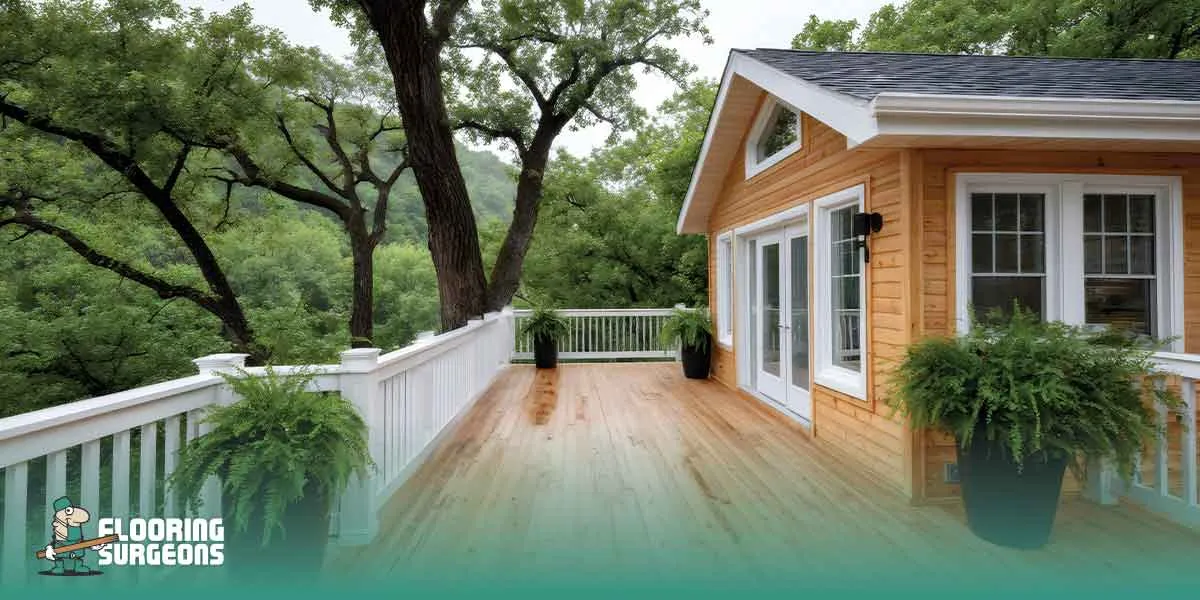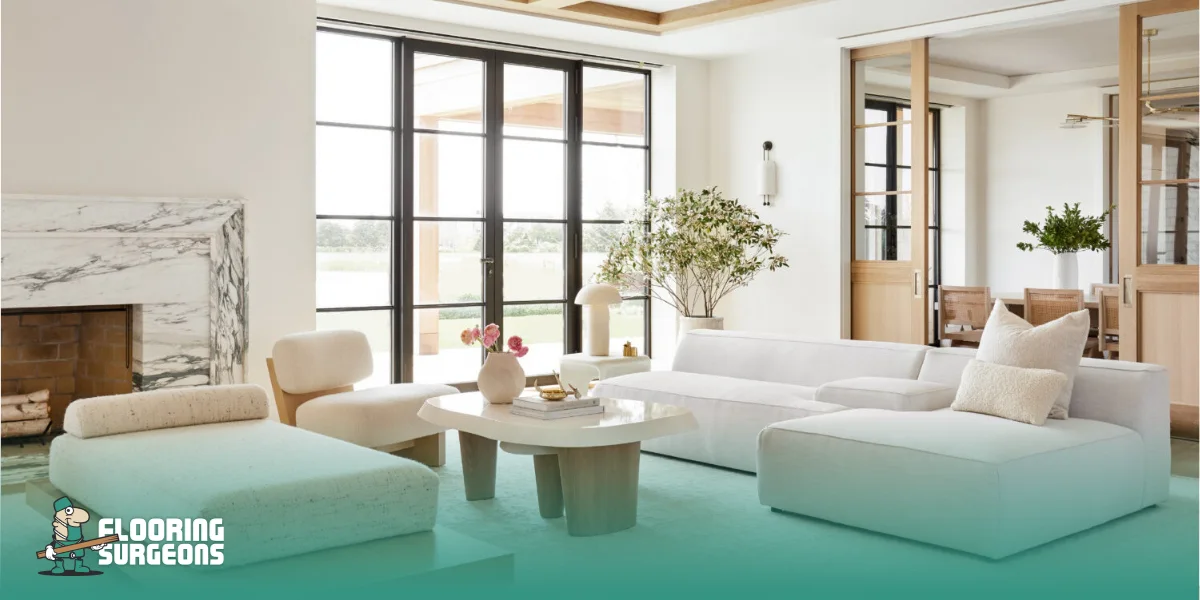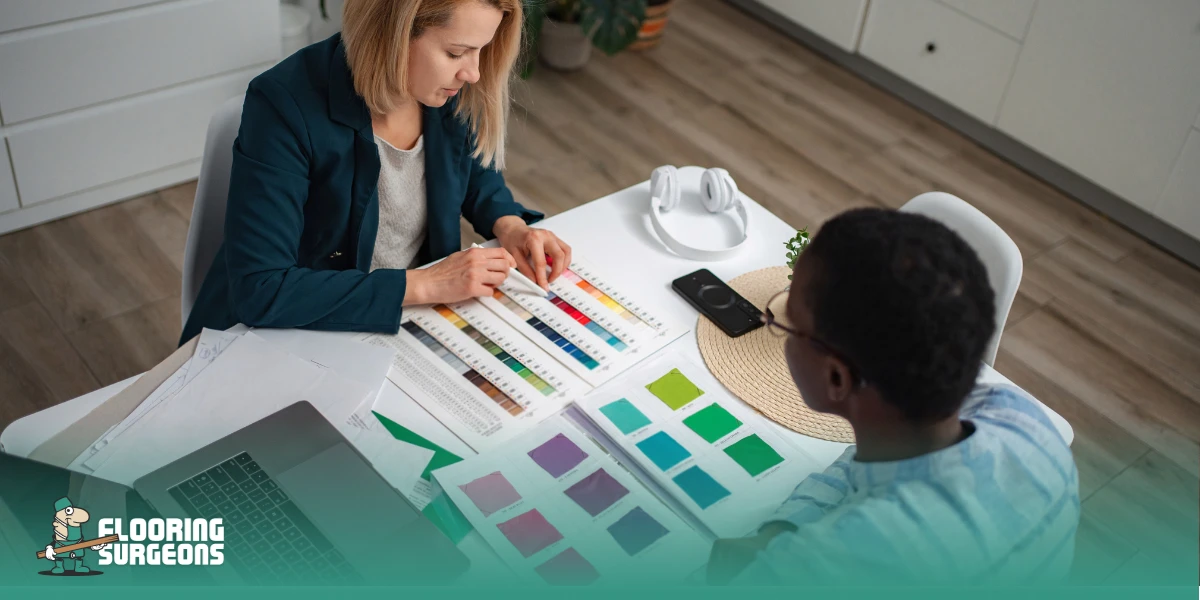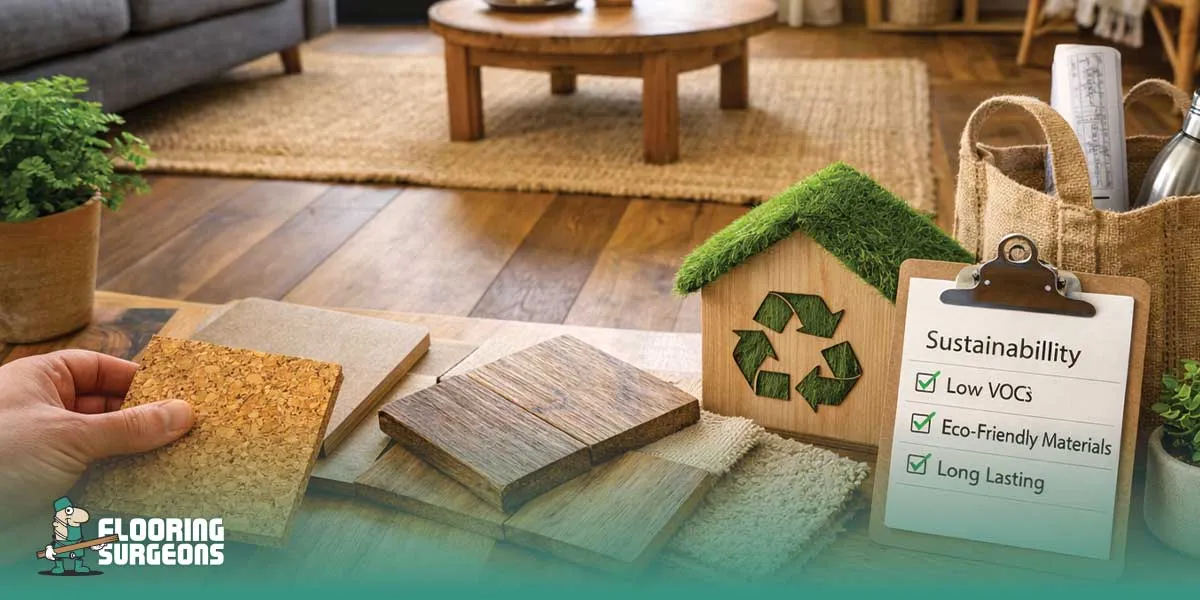Many homeowners wonder, Can vinyl flooring be used outdoors? Is it a viable option for spaces like patios, balconies, or even garden areas? While vinyl flooring is commonly known for its durability and aesthetic appeal indoors, its suitability for outdoor use depends on various factors. In this article, we’ll explore whether vinyl flooring can be used outside, the types of vinyl flooring that work best for outdoor areas, and how to ensure longevity when using vinyl outdoors.
So, can you use vinyl flooring outside? The answer isn’t a simple yes or no, as different types of vinyl flooring perform differently in outdoor environments. We’ll dive into the details, from luxury vinyl tiles to sheet vinyl, to help you determine if this flooring solution is right for your outdoor spaces.
Table of contents
Is Vinyl Flooring Suitable for Outdoor Spaces?
If you’re wondering about using vinyl flooring outside, whether it’s a vinyl plank or a vinyl sheet, you’ve come to the right place. There are some things to consider its viability outside, but, in short, yes, you can use vinyl flooring outside. Although vinyl flooring is often seen in bathrooms for its waterproof properties, its use outdoors is less widespread. It is sometimes used in patios or under porches, but it is not as long-lasting as other materials in direct sunlight. There are many pros and cons of vinyl flooring to consider before buying it for your home or business.
Waterproof, low maintenance, comes in many designs, and looks like real wood are just some of its pros. However, these reasons can be outweighed by the same problems when used outdoors, such as fading in the sun and warping from moisture and temperature changes. Can you use vinyl flooring outside? In extreme weather conditions, like direct sunlight, heavy rain, or temperature fluctuations? The type of vinyl flooring you choose and how it is installed matter.
Some are more resistant to these issues than others, so make sure you do your research. While some products claim to be “outdoor-ready,” not all vinyl flooring is created equal for use in harsh conditions.
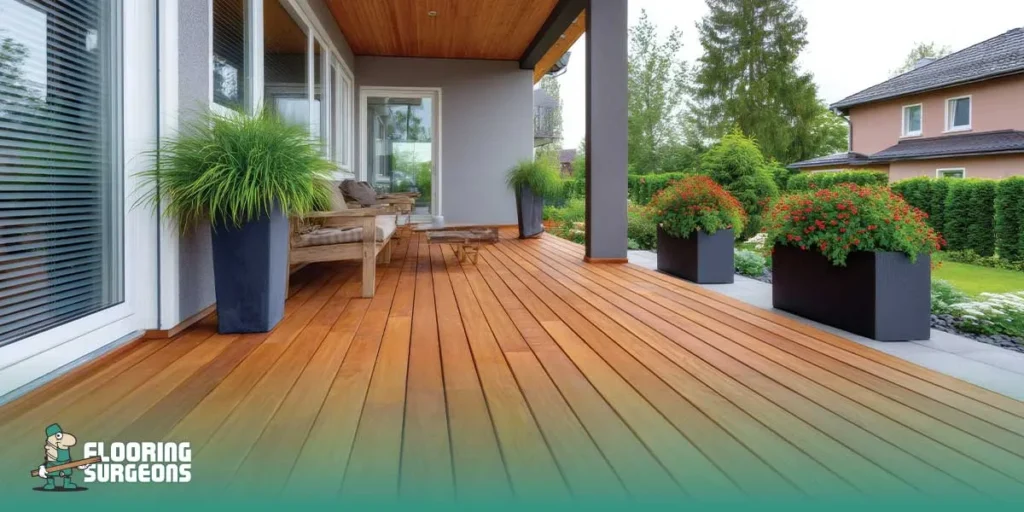
Common Challenges When Using Vinyl Flooring Outdoors
While it’s possible to use vinyl flooring in outdoor spaces, there are certain challenges that need to be considered. Can vinyl flooring be used outdoors year-round? The answer can vary depending on environmental factors such as climate, temperature changes, and exposure to moisture. Extreme heat or cold can cause some types of vinyl to warp, crack, or lose their shape. Additionally, can vinyl flooring be used outside in areas with high foot traffic or heavy furniture? Some vinyl floors may not withstand such wear and tear, especially in areas like patios or decks. It’s also important to consider UV rays, which can cause the flooring to fade or degrade over time.
If you’re looking into vinyl flooring for outdoor use, consider the price of luxury vinyl flooring options that are specifically designed to handle these challenges and offer durability for outdoor environments.
Outdoor-Friendly Vinyl Flooring Types
When choosing vinyl flooring for outdoor spaces, it’s essential to select a product designed to withstand outdoor conditions. The type of vinyl flooring you choose will significantly impact its performance and durability. Can vinyl flooring be used outdoors? Yes, but not all types of vinyl flooring are equally suited for exterior use. Some varieties, like sheet vinyl and self-adhesive luxury vinyl tiles (LVT), are better equipped to handle the demands of outdoor spaces. Let’s explore the best options for vinyl flooring in exterior environments.
Using Sheet Vinyl in Exterior Areas
Sheet vinyl is one of the most popular types of vinyl flooring due to its seamless installation and resistance to moisture. While primarily used indoors, it can be an excellent option for certain outdoor areas if installed correctly.
Advantages of Sheet Vinyl Outdoors
- Seamless and Waterproof: One of the biggest advantages of sheet vinyl for outdoor use is its seamless installation, which makes it highly resistant to water penetration. This feature is crucial for areas that experience heavy rain or moisture.
- Durability: Sheet vinyl can withstand light foot traffic, making it suitable for spaces like patios, balconies, or covered decks. It’s also easy to maintain and clean.
Potential Drawbacks of Sheet Vinyl
- Susceptible to Temperature Fluctuations: Can vinyl flooring be used outdoors in areas with extreme temperatures? Not all sheet vinyl types can handle dramatic temperature changes, such as high heat or freezing conditions. Over time, these temperature swings may cause the vinyl to expand or contract, leading to cracks or warping.
- Limited UV Resistance: Direct exposure to sunlight can cause some sheet vinyl products to fade or degrade, especially if the product isn’t designed with UV protection.
Best Tips for Installing Sheet Vinyl Outside
- Choose Outdoor-Specific Vinyl: Make sure the vinyl is rated for outdoor use and is UV-resistant. Check with a professional to ensure the material can withstand outdoor conditions.
- Prepare the Surface Properly: Before installation, ensure the Surface is clean, dry, and smooth. Any moisture or debris left on the Surface can cause the vinyl to lift or bubble.
- Use a Professional Installer: To ensure the vinyl is installed correctly and remains secure, it’s a good idea to hire professionals, such as the experts at flooring surgeons, to handle the job.
Self-Adhesive Luxury Vinyl Tiles (LVT) for Outdoor Use
Luxury vinyl tiles (LVT) are another great option for outdoor use, especially self-adhesive varieties. These tiles provide a high-end look with easy installation and durability.
Can luxury vinyl be installed over tile? Yes, LVT can be installed directly over existing tile, as long as the Surface is smooth and clean, providing a hassle-free update to outdoor areas.
Can you use luxury vinyl outside? Yes, some LVT products are designed for outdoor spaces, offering a high level of durability and style, perfect for spaces like decks, patios, and poolside areas. Ensure the LVT you choose is rated for exterior use to avoid damage from weather or UV rays.
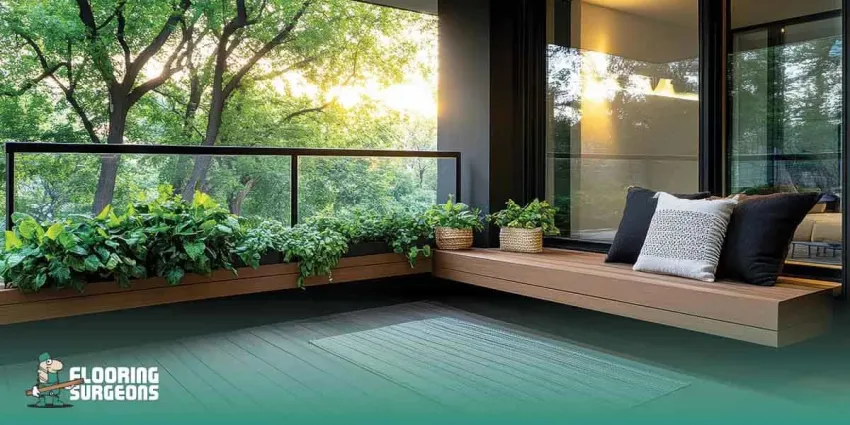
Other Durable Flooring Alternatives for Outdoors
When you ask “can you use vinyl flooring outside” or “can vinyl floor be used outside”, it’s helpful to explore other durable flooring options designed specifically for outdoor use. While vinyl can work in some cases, there are several alternatives that might be better suited for exterior spaces, providing durability, aesthetics, and weather resistance.
Porcelain and Ceramic Tiles Outdoors
Porcelain and ceramic tiles are often used outdoors due to their resistance to moisture, temperature fluctuations, and high foot traffic. These tiles are highly durable and have a low water absorption rate, which makes them ideal for environments with varying weather conditions. However, it’s important to choose tiles rated for exterior use to ensure they can withstand freeze-thaw cycles and direct sunlight. Additionally, the slip resistance of the tiles should be considered to prevent accidents in wet conditions.
Composite Decking Options
Composite decking is a combination of wood and plastic materials, making it resistant to weather, rot, and fading. It requires little maintenance compared to natural wood and can handle high traffic and exposure to the elements. Composite decking is a great option for those who want a low-maintenance outdoor floor that still offers an elegant look. One of the benefits is that composite decking doesn’t splinter, making it safer for barefoot walking. However, it can be more expensive than some other outdoor flooring solutions, so budget considerations are important.
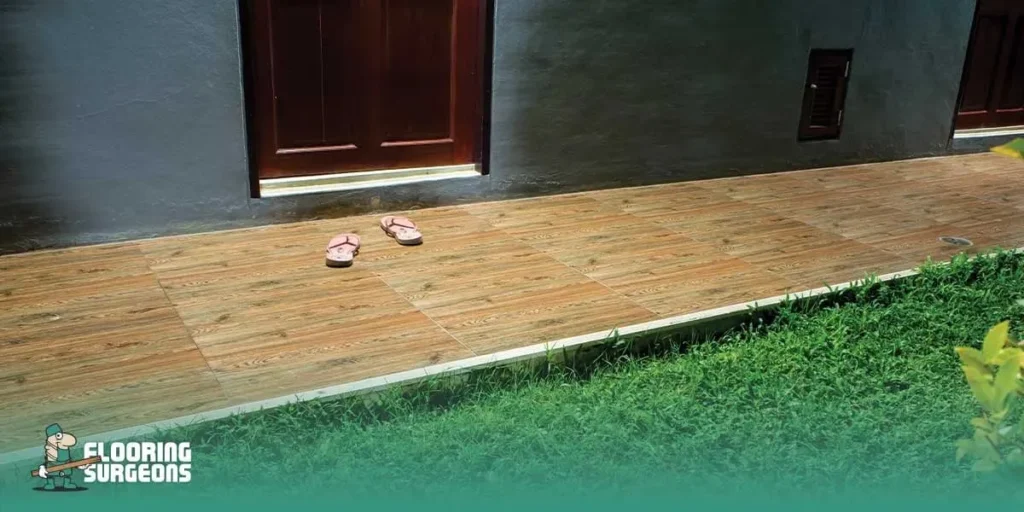
Natural Stone Surfaces
Natural stone, such as granite, limestone, and slate, brings both aesthetic appeal and excellent durability to outdoor spaces. Stone flooring is highly resistant to the elements and offers a timeless, luxurious look. It’s an ideal choice for patios, walkways, and pool areas. The primary drawback is that natural stone can be more expensive and may require regular maintenance, including sealing to protect against stains and moisture. Some types of stone can also be slippery when wet, so choosing a textured finish can enhance safety.
Concrete Flooring Solutions
Concrete is a very durable and long-lasting material for outdoor flooring. It can be stained or stamped to create different looks and designs. Concrete is a good option for large outdoor spaces, such as patios and decks. It can hold up well under heavy foot traffic and adverse weather conditions. However, concrete needs to be installed correctly, with proper drainage to avoid pooling of water on the Surface. It is also important to make sure that the concrete is properly treated in cold climates to prevent cracking from freeze-thaw cycles.
Vinyl flooring is not typically recommended for outdoor use. However, there are many other options available for outdoor flooring, such as porcelain tiles, composite decking, natural stone, and concrete. These options are more durable and long-lasting than vinyl flooring, and can stand up to the elements much better. Additionally, these materials can provide a more upscale look for your outdoor space. It is important to consider all of your options before making a decision about what type of flooring to use outdoors.
If you’re still leaning towards vinyl but are unsure about the best type for your project, you might want to explore options like Dark Luxury Vinyl Flooring. These types of vinyl offer both durability and style, making them a potential solution for specific outdoor areas, provided they are designed for exterior use.
How to Maintain Your Outdoor Flooring for Longevity
Maintaining your outdoor flooring is essential to ensure its longevity, whether you’re using vinyl flooring outdoors or other types of materials. Proper care will not only help preserve its appearance but also prevent damage caused by weather conditions, foot traffic, and outdoor elements.
If you’re wondering, “Can vinyl flooring be used outdoors?” or “can you use vinyl flooring outside?”, the answer is yes, but only if you take the necessary steps to maintain it. For example, luxury vinyl flooring may require specific care to ensure it holds up well in an exterior environment. Regular cleaning, protecting against UV rays, and ensuring proper drainage will help extend the life of your outdoor flooring.
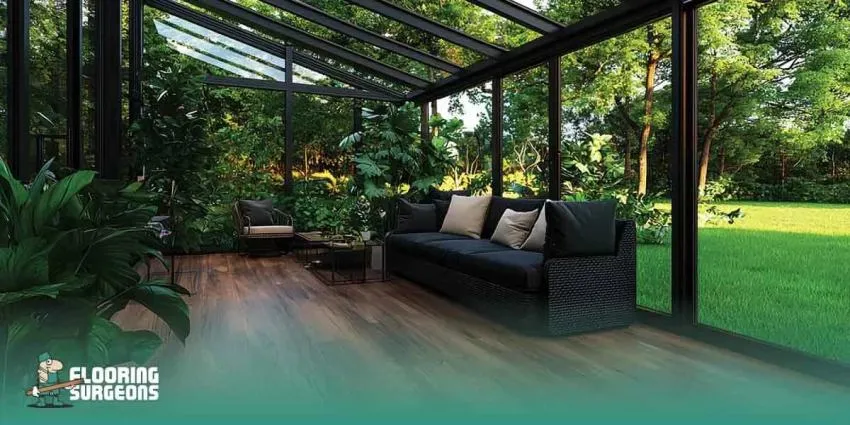
Tips for maintaining vinyl flooring outdoors:
- Regular Cleaning: Sweep or hose down the Surface regularly to remove debris, dirt, and leaves that could cause wear. For deeper cleaning, use a mild detergent with warm water to avoid damaging the Surface.
- UV Protection: Direct sunlight can cause fading or warping over time. Consider adding an outdoor rug, awning, or patio cover to protect the flooring from extended sun exposure. Some vinyl flooring products are UV-resistant, but it’s always a good idea to check if the product is designed for prolonged outdoor use.
- Sealant: Applying a sealant designed for outdoor vinyl can help protect the material from moisture and prevent it from becoming brittle in harsh weather conditions.
- Inspect and Repair: Periodically check for signs of wear, such as cracks, peeling, or bubbling. Promptly repair any damage to prevent further deterioration.
Final Thoughts
In summary, although it is possible to put vinyl flooring outside, you should make sure it is the best option for your needs. Vinyl flooring can be used outdoors, and in some cases, it may be a good option. In particular, certain luxury vinyl flooring may be used in outdoor areas such as patios or balconies, as long as it is labelled as such and designed to handle those conditions. In order to extend its life and ensure good performance, it is important to care for your outdoor flooring by cleaning it regularly and taking measures to protect it.
The best course of action is to weigh your options carefully and, if you’re not sure, ask a professional for advice on the best flooring choices for your outdoor space. Whether you choose to go with vinyl flooring or opt for an alternative material such as porcelain tiles, composite decking, or natural stone, the key is to select the right product for the job and maintain it well so that it can serve you well for years to come.
For detailed guidance on how to install vinyl flooring, check out our comprehensive installation guide to ensure you get the most out of your outdoor flooring.
Mina Asgari
I’m an SEO Specialist and Content Strategist focused on sustainable business growth. I design data-driven content strategies by deeply analyzing user intent, search behavior, and SEO best practices, ensuring every piece of content serves a clear purpose for both users and search engines.


